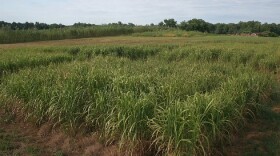The quest for clean, sustainable energy has scientists testing new ways to produce it. One approach is to look for savings in energy that’s currently being wasted. Researchers at Virginia Tech have come up with a new way to literally transform some of that waste into electricity.
And by waste, they mean human waste. It’s generated every day and treating it in conventional wastewater treatment plants takes around 5 percent of all the electricity this country uses every day. So scientists are looking at way to change that equation. Jason He is Associate Professor of Civil & Environmental Engineering at Virginia Tech. He says the wastewater itself, actually contains energy.
“Theoretically, the waste water contains more energy than what is being consumed for its treatment.”
It’s estimated that wastewater could yield up to ten times more energy than it takes to treat it. So scientists around the country and all over the world are working on ways to harvest it. Most are focusing on the methane in wastewater but HE and his colleagues are the first to come up with a way of creating electricity from bacteria in the water. They created they call a microbial fuel cell just like fuel cells made from other sources.
 Left -Xueyang Feng, Right - Jason He
Left -Xueyang Feng, Right - Jason He
“So we can use the bacteria to catalyze organic oxidation and extract the electrons generated from this oxidation and to convert that into energy because all the biochemical or chemical reactions involve electron transfer. It’s just a matter of how can we extract those electrons and make it into a useful form. So that’s the foundation of this microbial fuel cell. It’s a bacteria battery.”
A battery that uses electricity generated by the organics in human waste to help power the process of transforming that waste into clean water. After testing the concept in the lab, He and his colleague, Professor Xueyang Feng, recently completed a real world test at the Regional Water Treatment Plant in Radford. They found they were able to offset about 20% of the electricity it takes to clean wastewater.
“What we found is that the organics are very good to support bacterial growth so they can reproduce themselves a lot. “ The goal is to increase the efficiency and scale up. And of course, the raw materials for making electricity from human waste are clearly renewable resources. The results of the study are being published Journal, Scientific Reports.





